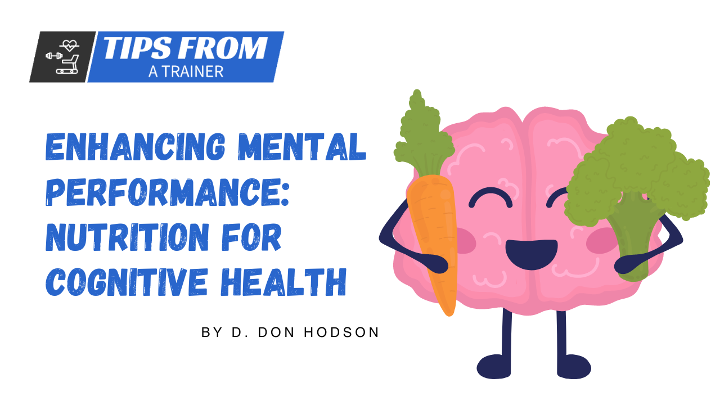Introduction
In today's fast-paced and demanding world, maintaining optimal cognitive health is crucial for overall well-being and productivity. The brain is a complex organ that requires proper nutrition to function at its best.
This article delves into the role of nutrition in enhancing mental performance and provides valuable insights on how to support cognitive health through dietary choices.
Table of Contents
Introduction
Understanding Cognitive Health
What is cognitive health?
Factors that affect cognitive function
Common cognitive challenges and concerns
The Brain-Nutrition Connection
How nutrition influences brain health
Essential nutrients for optimal cognitive function
The impact of dietary patterns on brain health
Key Nutrients for Cognitive Health
Omega-3 Fatty Acids
Antioxidants
B Vitamins
Adaptogens
Lifestyle Factors for Cognitive Health
Physical Activity
Quality Sleep
Stress Management
Dietary Strategies for Cognitive Health
Eat a Balanced Diet
Mediterranean Diet
Mindful Eating
Hydration
Supplement Considerations
Omega-3 Fatty Acids
Antioxidants
B Vitamins
Adaptogens
Putting It All Together: A Cognitive-Boosting Meal Plan
Breakfast
Mid-Morning Snack
Lunch
Afternoon Snack
Dinner
Evening Snack
Conclusion

Understanding Cognitive Health
What is cognitive health?
Cognitive health refers to the ability to think, learn, remember, and make decisions. It encompasses various mental processes such as attention, memory, language, problem-solving, and executive functions. Good cognitive health allows us to navigate daily tasks effectively and adapt to new situations.
Factors that affect cognitive function
Several factors can influence cognitive function. Age-related changes, chronic health conditions, lifestyle habits, stress, and genetics can impact brain health and cognitive performance. However, one factor that plays a significant role in cognitive function is nutrition.
Common cognitive challenges and concerns
Many individuals experience cognitive challenges at different stages of life. Some common concerns include memory decline, difficulty concentrating, brain fog, and mental fatigue. While these challenges can have various causes, nutrition can be a powerful tool to support cognitive function and mitigate the effects of cognitive decline.
The Brain-Nutrition Connection
How nutrition influences brain health
The brain is an energy-intensive organ, and proper nutrition is essential for its structure, function, and overall health. Nutrients obtained from food provide the building blocks for neurotransmitters, support cellular function, promote neuroplasticity, and protect against oxidative stress and inflammation. A well-balanced diet can optimize brain health and enhance mental performance.
Essential nutrients for optimal cognitive function
Several nutrients have been extensively studied for their role in cognitive function. Omega-3 fatty acids, antioxidants, B vitamins, vitamin D, and other micronutrients are particularly important for brain health. These nutrients contribute to neurogenesis, neuronal communication, neurotransmitter synthesis, and protection against oxidative damage.
The impact of dietary patterns on brain health
While individual nutrients are important, the overall dietary pattern also influences brain health. Research suggests that certain dietary patterns, such as the Mediterranean diet, DASH (Dietary Approaches to Stop Hypertension), and MIND (Mediterranean-DASH Diet Intervention for Neurodegenerative Delay), are associated with better cognitive function and a reduced risk of cognitive decline. These patterns emphasize whole foods, fruits, vegetables, healthy fats, lean proteins, and limited processed foods.
Key Nutrients for Cognitive Health
Omega-3 Fatty Acids
Omega-3 fatty acids, particularly docosahexaenoic acid (DHA), are vital for brain health. They contribute to the structure and function of cell membranes in the brain, promote neuroplasticity, reduce inflammation, and support neurotransmitter activity. Fatty fish like salmon, sardines, and mackerel are excellent sources of omega-3 fatty acids. Plant-based sources include chia seeds, flaxseeds, and walnuts.
Antioxidants
Antioxidants play a crucial role in protecting the brain from oxidative stress, which can lead to cognitive decline. Foods rich in antioxidants, such as berries, dark chocolate, spinach, kale, and colorful fruits and vegetables, help combat free radicals and promote brain health.
B Vitamins
B vitamins, including folate, B6, and B12, are essential for optimal cognitive function. They contribute to the synthesis of neurotransmitters, support methylation processes in the brain, and play a role in cognitive development and maintenance. Dietary sources of B vitamins include leafy greens, legumes, whole grains, eggs, and fortified cereals.
Vitamin D
Vitamin D has gained attention for its potential role in cognitive health. Receptors for vitamin D are found throughout the brain, and this vitamin is involved in neurodevelopment, neurotransmission, and neuroprotection. Sunlight exposure triggers vitamin D synthesis in the body, while dietary sources include fatty fish, fortified dairy products, and egg yolks.
Antioxidant-Rich Foods
Consuming a variety of antioxidant-rich foods is beneficial for brain health. Blueberries, dark chocolate, green leafy vegetables, tomatoes, and nuts are among the top sources of antioxidants that support cognitive function. Combining these foods in meals and snacks can provide a synergistic effect and maximize the benefits.
Lifestyle Factors for Cognitive Health
Physical Activity
Regular exercise has numerous benefits for brain health. It improves blood flow and oxygen delivery to the brain, promotes the growth of new neurons, enhances neuroplasticity, and reduces the risk of cognitive decline. Aim for a combination of aerobic exercises, strength training, and activities that challenge coordination and balance.
Quality Sleep
Sufficient and restful sleep is crucial for cognitive function and mental performance. During sleep, the brain consolidates memories, removes waste products, and rejuvenates. Establish a consistent sleep schedule, create a relaxing bedtime routine, and ensure your sleep environment is conducive to quality rest.
Stress Management
Chronic stress can negatively impact cognitive function and contribute to mental fatigue. Implement stress management techniques such as mindfulness meditation, deep breathing exercises, yoga, or engaging in hobbies and activities that bring you joy and relaxation. Prioritize self-care and find healthy ways to manage stress.
Mental Stimulation
Keeping your brain active and engaged is essential for cognitive health. Engage in activities that challenge your cognitive abilities, such as puzzles, reading, learning a new skill or language, playing musical instruments, or engaging in strategic games. Continuous mental stimulation helps maintain and improve cognitive function.
Dietary Strategies for Cognitive Health
Eat a Balanced Diet
A well-balanced diet that includes a variety of nutrient-dense foods is essential for optimal cognitive health. Focus on whole foods, such as fruits, vegetables, whole grains, lean proteins, and healthy fats. Incorporate different colors and textures to ensure a diverse range of nutrients.
Mediterranean Diet
The Mediterranean diet is often praised for its benefits to heart health, but it is also associated with improved cognitive function. This eating pattern emphasizes fruits, vegetables, whole grains, legumes, fish, and olive oil while limiting processed foods, red meat, and added sugars. It provides a rich array of antioxidants, omega-3 fatty acids, and other nutrients beneficial for brain health.
Mindful Eating
Practicing mindful eating can enhance the enjoyment of meals and support cognitive health. Slow down, savor each bite, and pay attention to hunger and fullness cues. Choose nutrient-dense foods and avoid distractions while eating, such as screens or multitasking. Mindful eating promotes a healthy relationship with food and helps maintain a balanced diet.
Hydration
Proper hydration is crucial for brain function. Even mild dehydration can impair cognitive performance. Aim to drink adequate water throughout the day and include hydrating foods like fruits and vegetables in your diet. Avoid excessive intake of sugary beverages and alcohol, as they can have negative effects on cognitive function.
Supplement Considerations
Omega-3 Fatty Acids
Omega-3 fatty acids, particularly EPA and DHA found in fatty fish like salmon and mackerel, have shown promising benefits for cognitive function. If you struggle to consume enough omega-3s through your diet, consider a high-quality fish oil supplement. Consult with a healthcare professional to determine the appropriate dosage.
Antioxidants
Antioxidants play a vital role in protecting the brain from oxidative stress and inflammation. Foods rich in antioxidants include berries, dark chocolate, spinach, kale, and green tea. While it's best to obtain antioxidants from whole foods, supplements like vitamin C, vitamin E, and resveratrol can be considered under professional guidance.
B Vitamins
B vitamins, such as folate, vitamin B12, and vitamin B6, are important for brain health and cognitive function. Sources include leafy greens, legumes, fortified cereals, and animal products. In certain cases, supplementation may be necessary, especially for individuals with specific dietary restrictions or deficiencies.
Adaptogens
Adaptogens are natural substances that help the body adapt to stress. While their impact on cognitive function is still being researched, certain adaptogens like ashwagandha and rhodiola rosea have shown potential benefits for reducing stress and improving mental clarity. Consult with a healthcare professional before incorporating adaptogens into your routine.
Putting It All Together: A Cognitive-Boosting Meal Plan
Breakfast
Start your day with a bowl of oatmeal topped with berries, nuts, and a sprinkle of cinnamon. Pair it with a side of Greek yogurt for added protein and probiotics.
Mid-Morning Snack
Enjoy a handful of walnuts and a piece of dark chocolate for a dose of healthy fats and antioxidants.
Lunch
Prepare a colorful salad with mixed greens, grilled salmon, avocado, cherry tomatoes, and a drizzle of olive oil and lemon dressing. Serve with a side of quinoa or whole-grain bread.
Afternoon Snack
Have a serving of blueberries and a small handful of almonds for a nutritious and brain-boosting snack.
Dinner
Opt for a lean protein like roasted chicken or tofu, served with a generous portion of steamed vegetables and a side of brown rice or sweet potatoes.
Evening Snack
End your day with a relaxing cup of herbal tea, such as chamomile or peppermint, to promote quality sleep and relaxation.
Conclusion
Enhancing mental performance and supporting cognitive health requires a holistic approach that includes lifestyle factors, dietary strategies, and supplement considerations. By adopting a balanced and nutrient-rich diet, engaging in regular physical activity, managing stress levels, and prioritizing restful sleep, you can optimize your brain function and maintain mental clarity.
Remember, each individual is unique, and it's essential to listen to your body's specific needs. Consult with a healthcare professional or registered dietitian to personalize your approach and ensure you're meeting your nutritional requirements.
By implementing the strategies outlined in this article and making cognitive health a priority, you can enhance your mental performance, improve focus and concentration, and support long-term brain health throughout your life.

Don Hodson, Certified Personal Trainer
I'm Don, an ACE-certified personal trainer and the founder of Tips From A Trainer. With my passion for fitness and years of experience, I've helped countless individuals transform their physiques!
Having personally overcome weight challenges throughout my life, I understand the struggle. Through consistency, exercise, and a balanced diet, I have managed to stay in shape and I want to share my message with the world!
The fitness industry is fraught with misconceptions and deceptive practices, which is why I am committed to providing you with the truth.
- My Site: www.Don-Hodson.com
- My Company: www.ConnectedAgeMarketing.com

Nutrition for Cognitive Health